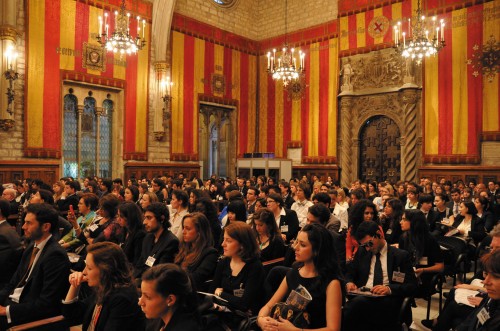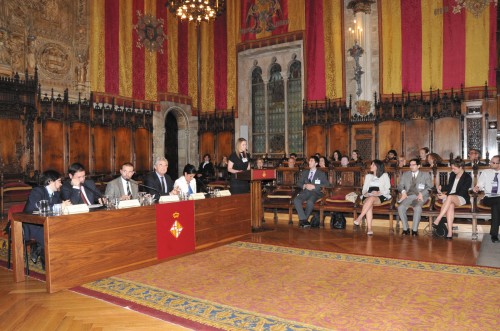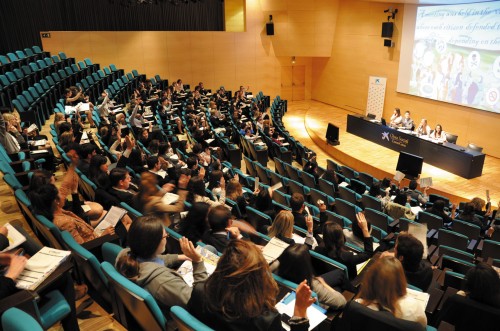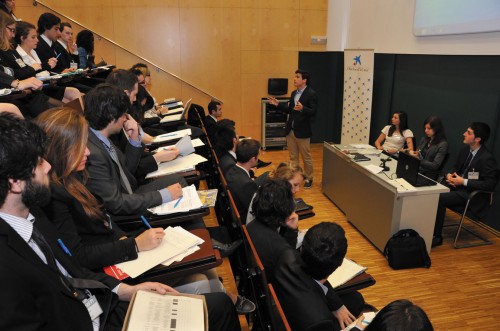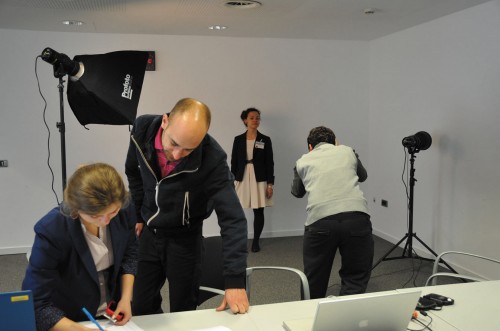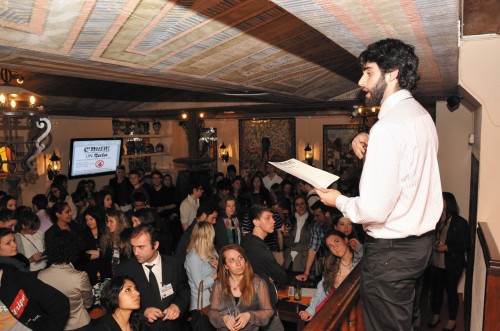The seventh edition of C’MUN was undoubtedly the most difficult to do, being marked by a grave economic situation that unfortunately seems to have no clear solution. On the contrary, the crisis is aggravating the already evident degradation of our Western democracies. Far from serving the citizens, it benefits some interest of the so-called market and makes our confidence in the system totter – up to a point that makes apparent the need for deep regeneration from corruption, political submission, the unequal application of justice and the incongruity of leaving the solutions to the crisis in the hands of those who have steered towards it. Capitalism has been confused selfishly with democracy, whereas they are not the same. The first is an economic system in theory serving the people. The latter is a value system that has become the cornerstone of our societies.
Few organizations know more about the values on which democracy is founded than ANUE, who has made the defense of these principles the center of fifty years of work, initiated in a country that back then used to live in black and white. Its history is a good example that these democratic values can be abandoned, betrayed or set aside in dark times – as well in the past as in the present – but they will never disappear, because they are backed up by the people. It’s the Charter of the United Nations itself referring to our power and our responsibility as a people. It’s time to defend these values again.
Modestly, we believe that ANUE can stimulate this regeneration by activities like C’MUN. We think that C’MUN is a “school” where the values underpinning democracy are taught “learning by doing”: resolving disputes through dialogue and working together, having a space to promote universality and plurality, designing an activity that encourages empathy and coexistence. That is C’MUN.
This year we knew that we had to put forward a versatile debate reflecting as accurately as possible the “image” of the incongruous and unbalanced world we live in, in order to establish the need for regeneration in the fields of economy, environment, security, the extension or limitation of rights, or the renewal of the United Nations. The ultimate goal is to establish an “agenda of change”, characterized again by the values and democratic principles, basis of an Organization of United Nations that suffers like no other institution from the impoverishment of values. Now more than ever we have to help to renew it, if we want to give ourselves a truly fair and effective multilateral space.
With this ambition, C’MUN 2012 started off on May 2 in the Auditorium of CosmoCaixa with a massive (more than 150 delegates attended) training session and the obligatory registration day for the simulation’s participants. In the afternoon, the C’MUN started officially with the opening ceremony held at the Barcelona City Hall’s Saló de Cent, in presence of Raimond Blasi, Councilor of trade, consumption and markets, and Manel Manonelles, Director of the Culture of Peace Foundation, along with the presidents of ANUE, the simulation’s directors and the chairpersons of the debate committees.
A “heavy” C’MUN
Despite the heavy loss of participants from Greece and Italy, countries struck heavily by the economic crisis, nearly 300 delegates began the committee sessions on Thursday, May 3 at CosmoCaixa in a very intense morning. Four of the committees welcomed expert guest speakers at their inaugural conferences: Arcadi Oliveres, activist and President of Justícia i Pau, joined the Human Rights Council; Pablo Pareja, Professor of International Law, the General Assembly; Ana Barreira López, Director of the International Institute of Law and Environment (IIDMA), the Environmental Commission; and once more, Manel Manonelles the Ecosoc.
Having almost no time to immerse themselves into the debates, the announcement of an international concert of heavy metal/hard-rock music “legends” being attacked in Guatemala City shocked the simulation, especially the Security Council and the Council of Human Rights. Orchestrated by the Mexican criminal group Los Zetas, the dramatic situation with over 600 dead and thousands wounded highlighted the need to decisively place drug trafficking on the international agenda. The great and very rewarding group work of the model’s team should turn the “C’MUN’s crisis” into a stimulus for further negotiations on issues such as implementing the responsibility to protect or limits on the right to demonstrate.
With the ongoing crisis and the other committees functioning well, the first day’s session ended with a great vibe. The highlight came at dusk, celebrating a new edition of the UN Quiz, combining the expertise of the delegates of the International organization in a more relaxed atmosphere.
Friday was a calm day for the C’MUN team. With the exception of tensions in the International Criminal Court, unfortunately exceeding the field of simulations, we could see from a privileged point of view how the sessions evolved, trying to help the committees like the General Assembly, which dealt with the reform of United Nations, resolving doubts, giving certain delegates the possibility to participate in other committees and ensuring, in short, to make the debates as enriching as possible. In the afternoon, after checking that the majority of commissions were on track with their working papers and draft resolutions, most of the delegates went to the “cultural evening” enjoying the Picasso Museum, the Sagrada Família, the MNAC or the Barça stadium.
Example of democratic values
As usual, Saturday morning was a busy day in the commissions to achieve to complete the final decisions in time. The search for consensus or at least for the broadest majority possible demonstrated the committee chairpersons’ quality, dedication and negotiation skills at giving an example of what democracy should be, of what we want and what we need, also in the United Nations.
Once having completed the work in the commissions, and after eating, the closing act of C’MUN 2012 took place in presence of Marcelino Cabanas, Deputy Director of foreign policy and multilateral, global and security affairs, of the Ministry of Foreign Affairs, and now Spanish Ambassador in Cameroon, who declared himself dazzled by the work done and by what is represented by the simulation. A work that shows that there is another way of doing things, far away from the bundle of embarrassing decisions taken every day in this country, as in many others, where citizens are no longer taken into account – and that there are values behind this work.
Many thanks to all the institutions that have supported the C’MUN 2012, especially to the C’MUN/ANUE team. Working with you has been and is a pleasure and a privilege. You have made this simulation possible. And finally, a big thank you to all the delegates. You have defended the democratic values with your commitment and you have shown that young people refuse to be part of a new “lost generation”. We want to be part of the generation that will transform the world.

